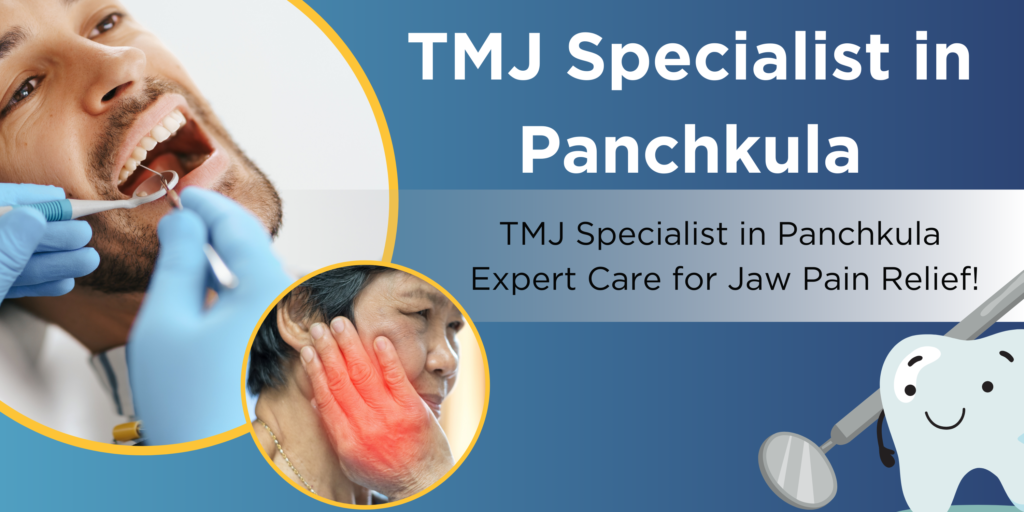Experiencing persistent jaw pain, difficulty chewing, or frequent headaches? These could be signs of a temporomandibular joint (TMJ) disorder, a condition that affects the movement and function of the jaw. If left untreated, TMJ disorders can lead to chronic pain and further complications. Seeking the expertise of a TMJ specialist in Panchkula can help diagnose and treat the issue effectively. Dr. Priyanka Gupta, a highly experienced professional in the field, offers specialized treatments that best to each patient’s needs, ensuring long-term relief and improved oral health. Consulting a Jaw Specialist in Panchkula can provide the right diagnosis and treatment for lasting relief.
Understanding TMJ Disorders
The temporomandibular joint (TMJ) is a crucial part of the jaw structure, responsible for smooth movements needed for talking, chewing, and yawning. Any dysfunction in this joint can cause discomfort and impact daily activities. TMJ disorders can arise due to multiple factors, such as:
- Chronic teeth grinding (bruxism)
- Stress-related jaw clenching
- Jaw injuries or trauma
- Arthritis affecting the joint
- Misalignment of teeth or bite
Recognizing the causes early and seeking professional intervention can prevent the condition from worsening.
Common Symptoms of TMJ Disorders
TMJ disorders can present with a wide range of symptoms, often making it difficult to pinpoint the exact cause. Some of the most commonly reported symptoms include:
- Persistent pain or tenderness in the jaw
- Clicking, popping, or grating sounds while opening or closing the mouth
- Difficulty in chewing or biting food
- Frequent headaches or ear pain
- Jaw locking, making it difficult to open or close the mouth fully
If you experience any of these symptoms, it’s advisable to consult a TMJ specialist in Panchkula as early as possible to prevent further complications.
How TMJ Disorders are Diagnosed?
A precise diagnosis is the first step toward effective treatment. Dr. Priyanka Gupta conducts comprehensive evaluations, which may include:
Medical History Review:
Understanding past dental issues, injuries, and symptoms.
Physical Examination:
Checking jaw movement, pain levels, and alignment.
Imaging Tests:
X-rays, CT scans, or MRI scans to assess the condition of the joint and surrounding structures.
By conducting these tests, the specialist can determine the severity of the disorder and suggest appropriate treatment options.
Non-Surgical Treatment Approaches
Many TMJ disorders can be managed with non-invasive techniques, eliminating the need for surgery. Some effective non-surgical treatments include:
1. Lifestyle Modifications
Simple changes in daily habits can help reduce strain on the jaw, such as:
- Avoiding hard or chewy foods.
- Practicing relaxation techniques to reduce stress-related clenching.
- Maintaining good posture to minimize jaw tension.
2. Medications
Prescribed medications can alleviate pain and inflammation, such as:
- Anti-inflammatory drugs
- Muscle relaxants
- Pain relievers
3. Physical Therapy
Specialized exercises and techniques can improve jaw mobility and relieve pain. These include:
- Jaw stretching exercises
- Heat and cold therapy
- Ultrasound therapy
4. Mouthguards or Splints
Custom-fitted dental devices help align the jaw properly and prevent teeth grinding, reducing stress on the TMJ.
Advanced and Surgical Treatment Options
For severe TMJ cases that do not respond to non-surgical methods, advanced treatments may be required. Some of these include:
1. Orthodontic Corrections
If misaligned teeth contribute to TMJ issues, orthodontic treatments like braces or dental restorations may be recommended to improve jaw function.
2. Injection Therapy
Botox or corticosteroid injections can provide temporary relief by relaxing jaw muscles and reducing inflammation.
3. TMJ Surgery
Surgical interventions are considered when all other treatments fail. These may include:
Arthrocentesis:
A minimally invasive procedure to flush out inflammation and improve joint movement.
TMJ Arthroscopy:
A small surgical procedure using an endoscope to repair joint damage.
Open-Joint Surgery:
A last-resort option for severe TMJ dysfunctions requiring structural correction.
Why Choose a TMJ Specialist?
Proper diagnosis and treatment of TMJ disorders require expertise. Consulting a skilled specialist ensures that you receive personalized care using advanced technology and treatment techniques. With a patient-centered approach, she provides comprehensive solutions tailored to individual needs, helping restore normal jaw function and comfort.
Self-Care Tips to Manage TMJ Pain at Home
While professional treatment is essential for severe cases, some home remedies can help manage mild TMJ symptoms:
- Apply warm compresses to relax the jaw muscles.
- Practice gentle jaw exercises to improve mobility.
- Reduce stress through meditation or breathing exercises to minimize clenching.
- Use over-the-counter pain relievers when necessary.
- Avoid excessive chewing and hard foods to prevent strain.
Implementing these self-care techniques alongside professional treatment can enhance recovery and prevent future TMJ problems.
Conclusion
Living with TMJ disorders can be challenging, but with the right diagnosis and treatment, relief is possible. Seeking professional care from a trusted TMJ Specialist in Panchkula, such as Dr. Priyanka Gupta, can help you find effective solutions for your jaw pain and discomfort. If you are experiencing persistent TMJ symptoms, don’t wait—schedule a consultation today and take the first step toward better oral health and overall well-being. Finding the best TMJ specialist near me ensures expert care and a personalized treatment plan for lasting relief.
